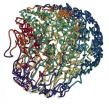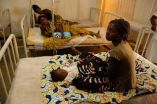(Press-News.org) Vienna, Austria: A new genetic "signature" to identify prostate cancer patients who are at high risk of their cancer recurring after surgery or radiotherapy has been developed by researchers in Canada, the 33rd conference of the European Society for Radiotherapy and Oncology (ESTRO33) in Vienna will hear today (Saturday).
Professor Robert Bristow will tell the conference that although surgery and precision radiotherapy are the mainstays of treatment for cancer that is confined to the prostate, the cancer will return in between 30-50% of patients due to spread of the disease outside the prostate gland that was undetected during the initial treatment.
"Men who fail treatment within two years may be at the highest risk of dying from their prostate cancer," he will say. "Existing methods for identifying high risk patients are imperfect, so new tests are required that are better at predicting which patients will have their cancer recur. These men can then be offered additional treatments, such as chemo- and hormone therapy, that will combat the prostate cancer throughout their entire body, rather than therapies solely focused on the prostate, in order to improve their chances of survival."
Prof Bristow (MD, PhD, FRCPC), a clinician-scientist at the Princess Margaret Cancer Centre and a Professor at the University of Toronto, Canada, and Dr Paul Boutros from the Ontario Institute of Cancer Research, together with their Canadian team, have developed a "signature" based on the DNA of the patient's prostate cancer that can accurately predict treatment failure in patients undergoing radiotherapy or surgery. The tumour's genetic characteristics and its microenvironment were analysed from biopsy tissue taken before the start of treatment.
"This is the first report of a test using this information derived from biopsy samples that can predict with close to 80% accuracy which men are at high or low risk of their prostate cancer recurring," he will say.
The researchers need to validate the test over the next two to three years in different and larger groups of patients to ensure that it will work successfully in hospitals worldwide. "If all goes well, then this will lead to a new test for cancer patients that can be turned around in three days and will tell doctors which patients will do well with local treatment alone – surgery or radiotherapy – and which will need extra treatment," Prof Bristow will say.
The researchers analysed DNA from biopsied tissue taken from 126 men who were predicted to be at intermediate risk of their cancer returning. The men were treated with image-guided radiotherapy (IGRT), which focuses the radiation more precisely on the tumour, and they were followed up for an average of 7.8 years. The researchers used a process for analysing the tumour DNA called array comparative genomic hybridization (aCGH), which looks at the patient's whole genome and identifies areas where there are missing, extra or irregular sections of DNA. From this information they were able to develop the genetic signature that identified men at high and low risk of their cancer recurring.
Then the researchers tested the genetic signature on a second group of 150 patients who were also at intermediate risk of cancer recurrence and who went on to have their tumours removed by surgery (radical prostatectomy). The signature test produced results similar to those in the first group.
In a secondary study, the researchers tested the oxygen content of the tumours from men treated with IGRT and found that this also predicted outcome, independently of the genetic signature test. Tumours with high levels of hypoxia (oxygen deprivation) were associated with worse survival.
"Importantly, we found that when we combined the signature with the additional information about the tumour's oxygen content, this made the genetic test even more accurate," Prof Bristow will say.
Men with low levels of genetic changes and low hypoxia had the best outcome, with 93% surviving for five years without their cancer recurring. Men with high levels of genetic alterations and high hypoxia had worse outcomes, with 49% surviving for five years without recurrence.
"These results will enable us to develop a new way of personalising medicine, so that we can improve cure rates and reduce the chances of the cancer spreading to other parts of the body," concludes Prof Bristow.
Professor Vincenzo Valentini, president of ESTRO and a radiation oncologist at the Policlinico Universitario A. Gemelli, Rome, Italy, commented: "This is exciting research because an accurate and quick test that can predict which men are most likely to need extra treatment to reduce the risk of a recurrence of their cancer is urgently needed. If the utility of this genetic signature is confirmed in further research over the next few years, it could become an important tool for helping us to better target appropriate treatment according to the genetic make-up of each man's tumour."
INFORMATION:
Abstract no: O-0139, "Interdisciplinary 2: Prediction and modelling" session, 16.15-17.15 hrs (CEST) on Saturday, 5 April, Strauss 1.
[1] The Movember Foundation, Prostate Cancer Canada, Ontario Institute for Cancer Research, and the Princess Margaret Cancer Centre Foundation funded the study.
New test developed to detect men at high risk of prostate cancer recurrence
2014-04-05
ELSE PRESS RELEASES FROM THIS DATE:
Undocked working dogs at greatest risk of tail injuries in Scotland
2014-04-05
Undocked working dogs in Scotland are at greatest risk of tail injuries, indicates a survey of their owners, published in this week's Veterinary Record.
Of 2860 working dogs, 13.5% sustained at least one tail injury during the 2010/11 shooting season. But undocked spaniels (56.6%) and hunt point retrievers (38.5%) were at greatest risk. To ward off one tail injury during one shooting season would require between two and 18 spaniels or hunt point retrievers to be docked as puppies, say the authors, who conclude that docking the tails of these breeds by one-third would ...
Brachytherapy helps maintain erectile function in prostate cancer patients without compromising treatment outcomes
2014-04-05
Vienna, Austria: The use of permanent brachytherapy, a procedure where radioactive sources are placed inside the prostate, into or near to the tumour, preserves erectile function in approximately 50% of patients with prostate cancer, a researcher will tell the ESTRO 33 congress today (Saturday).
Brachytherapy works by giving a high dose of radiotherapy directly to the tumour, but only a very low dose to the surrounding normal tissues. Since erectile dysfunction (ED) can occur in up to 68% of patients who receive external beam radiotherapy for the condition, this is a ...
Loneliness impacts DNA repair
2014-04-05
In captivity, grey parrots are often kept in social isolation, which can have detrimental effects on their health and wellbeing. So far there have not been any studies on the effects of long term social isolation from conspecifics on cellular aging. Telomeres shorten with each cell division, and once a critical length is reached, cells are unable to divide further (a stage known as 'replicative senescence'). Although cellular senescence is a useful mechanism to eliminate worn-out cells, it appears to contribute to aging and mortality. Several studies suggest that telomere ...
Major genetic study links liver disease gene to bladder cancer
2014-04-04
A University of Colorado Cancer Center study published today in Journal of the National Cancer Institute (with related research being presented this weekend at the American Association for Cancer Research Annual Conference 2014) details the discovery of a new genetic driver of bladder cancer: silencing of the gene AGL.
"We tend to think of cancer resulting from mutations that let genes make things they shouldn't or turn on when they should be quiet. But cancer can also result from loss of gene function. Some genes suppress cancer. When you turn off these suppressors, ...
Scientists generate 3D structure for the malaria parasite genome
2014-04-04
RIVERSIDE, Calif. — A research team led by a cell biologist at the University of California, Riverside has generated a 3D model of the human malaria parasite genome at three different stages in the parasite's life cycle — the first time such 3D architecture has been generated during the progression of the life cycle of a parasite.
The parasite that causes malaria in humans is Plasmodium falciparum. The female Anopheles mosquito transmits P. falciparum from an infected human to healthy individuals, spreading malaria in the process. According to the World Health Organization, ...
Analysis finds less research attention given to diseases of the poor
2014-04-04
Death is not distributed equally around the world. In high-income countries, people typically die in old age of chronic diseases such as cancer or cardiovascular problems. In low-income countries, death comes primarily from infectious and perinatal diseases, and strikes at a young age.
But despite massive international efforts to improve global health, a new analysis of nearly 4 million scientific articles finds that research is disproportionately focused on diseases that primarily afflict wealthy countries. Correspondingly, less research attention is given to diseases ...
Nowhere to hide: Kids, once protected, now influenced by tobacco marketing
2014-04-04
(Lebanon, NH, 04/04/14) — More than 15 years ago, many states and tobacco manufacturers established restrictions to prevent youth exposure to the marketing of nicotine products. This follows regulations imposed 50 years ago that banned cigarette ads from TV. Despite these continued efforts, a new study by Dartmouth researchers reveals that not only are young people exposed to tobacco marketing, they are influenced by it. According to a study published in the Journal of Adolescent Health, exposure to "direct marketing" is associated with increased use of tobacco.
"For ...
Does a junk food diet make you lazy? UCLA psychology study offers answer
2014-04-04
A new UCLA psychology study provides evidence that being overweight makes people tired and sedentary — not the other way around.
Life scientists led by UCLA's Aaron Blaisdell placed 32 female rats on one of two diets for six months. The first, a standard rat's diet, consisted of relatively unprocessed foods like ground corn and fish meal. The ingredients in the second were highly processed, of lower quality and included substantially more sugar — a proxy for a junk food diet.
After just three months, the researchers observed a significant difference in the amount ...
Higher social class linked to fewer bone fractures among non-white women
2014-04-04
If you are a middle-aged African-American or Asian woman, your social class may play a significant role in how likely you are to suffer bone fractures, a UCLA-led study suggests.
The study, published in the current issue of Osteoporosis International, is unique in that it followed Asian, African-American and white women for a period of nine years during mid-life; most previous studies on socioeconomic status and osteoporosis risk had focused solely on older white women and often had not collected information on fractures over time.
The new findings help shed ...
EAGeR medical trial: Low-dose aspirin won't prevent pregnancy loss
2014-04-04
BUFFALO, N.Y. – The Effects of Aspirin in Gestation and Reproduction (EAGeR) medical trial has found that, in general, low-dose aspirin is not beneficial for future pregnancy outcomes in women with prior pregnancy loss.
However, in women with one pregnancy loss within the previous 12 months, there did appear to be a benefit.
Jean Wactawski-Wende, PhD, professor in the Department of Epidemiology and Environmental Health in the School of Public Health and Health Professions at the University at Buffalo, is a principal investigator of the Buffalo EAGeR trial and co-author ...



